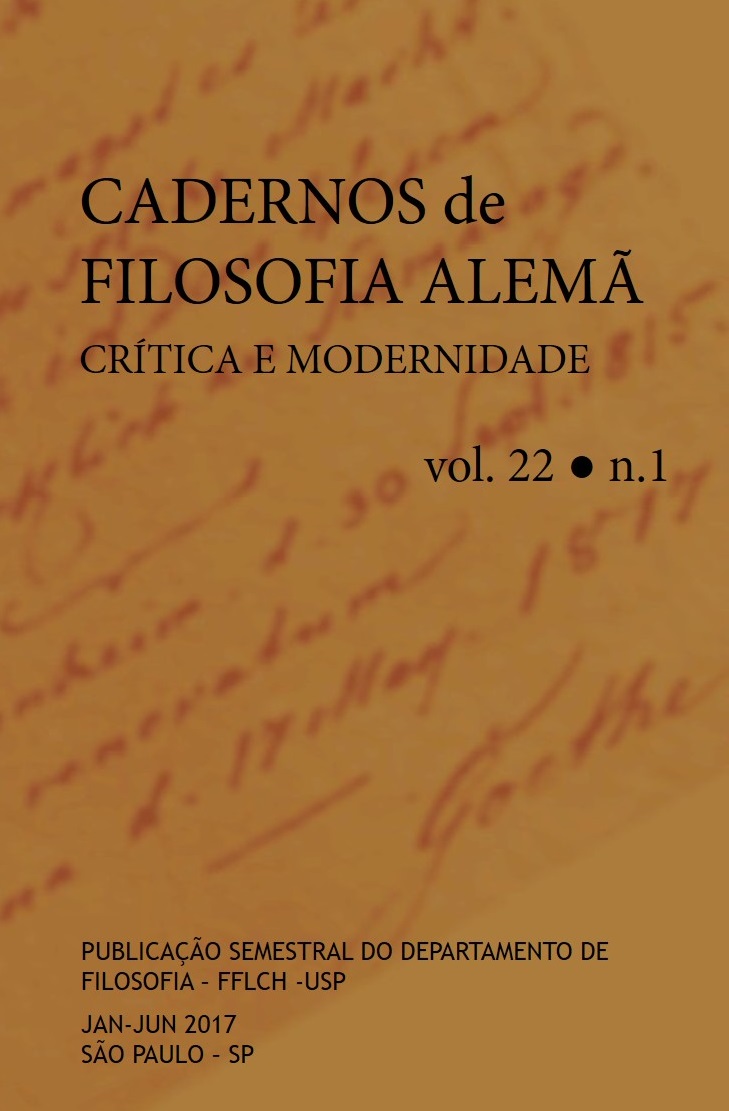A Teoria Crítica da Escola de Frankfurt e a persistência do populismo autoritário nos Estados Unidos
DOI:
https://doi.org/10.11606/issn.2318-9800.v22i1p13-38Palavras-chave:
Teoria Crítica, populismo de direita, autoritarismo, Escola de Frankfurt.Resumo
A primeira parte deste artigo fornece um breve resumo dos estudos sobre o autoritarismo e o populismo de direita dos Teóricos Críticos. A segunda parte analisa a emergência do Tea Party e o sucesso de Donald Trump em expandir e intensificar este movimento populista de direita ao atrelá-lo à sua liderança autoritária. Com base nos recursos conceituais expostos na primeira seção, pretendo demonstrar na segunda seção como as análises do populismo de direita e do autoritarismo dos Teóricos Críticos ainda podem explicar aspectos chave do Tea Party e de Trump. Ao longo deste artigo, a Teoria Crítica e o populismo de direita são situados em dois níveis de periodização histórica: o primeiro é a época burguesa moderna como um todo e o segundo se refere a períodos específicos desta época. O objetivo desta última periodização é esclarecer as condições históricas e sociais específicas que inibiram ou favoreceram o surgimento do populismo de direita e dos movimentos autoritários.
Downloads
Referências
Abromeit, J. (2011). Max Horkheimer and the Foundations of the Frankfurt School. New York: Cambridge University Press.
_____________. (2013). Whiteness as a Form of Bourgeois Anthropology? Historical Materialism and Psychoanalysis in the Work of David Roediger, Max Horkheimer, Erich Fromm, and Herbert Marcuse. Radical Philosophy, 16(1), pp.325–343.
_____________. (2013a). Review of “Friedrich Pollock and Theodor W. Adorno, Group Experiment and Other Writings: The Frankfurt School on Public Opinion in Postwar Germany”. Journal of Modern History, 85(1), pp.161-168
_____________. (2016). “Transformations of Producerist Populism in Western Europe”. In: Transformations of Populism in Europe and the Americas: History and Recent Tendencies. J. Abromeit, B. Chesterton, Y. Norman and G. Marotta (eds.). London and New York: Bloomsbury.
Adorno, T.; Frenkel-Brunswik, E; Levinson, D. J.; Sanford, R. N. (1950). The Authoritarian Personality. New York: Harper & Brothers.
Adorno, T. (1969). “Scientific Experiences of a European Scholar in America”. In: D. Fleming and B. Bailyn (eds.). The Intellectual Migration: Europe and America, 1930–1960. Cambridge, MA: Harvard University Press.
_____________. (1977). “Über Tradition”. In: Rolf Tiedemann (ed.). Gesammelte Schriften, vol. 10.1. Frankfurt a.M.: Suhrkamp.
_____________. (1998). “The Meaning of Working through the Past”. In: Critical Models: Interventions and Catchwords. Edited and translated by Henry Pickford. New York: Columbia University Press.
_____________. (1998a). “Vorlesungen zur Ästhetik (1967)”. Wolfgang Kraushaar (ed.). Frankfurter Schule und Studentenbewegung, vol. 2. Hamburg: Zweitausandeins.
Benjamin, W. (1968). “Theses on the Philosophy of History”. In: Illuminations. Hannah Arendt (ed). Translated by Harry Zohn. New York: Schocken.
Formisano, R. (2012). The Tea Party: A Brief History. Baltimore: Johns Hopkins University Press.
Fritzsche, P. (1998). Germans into Nazis. Cambridge, MA: Harvard University Press.
Fromm, E. (1983). Arbeiter und Angestellte am Vorabend des Dritten Reiches: Eine sozialpsychologische Untersuchung. Wolfgang Bonss (ed.). Munich: Deutscher Taschenbuch Verlag, 1983.
Hobsbawm, E. (1994). The Age of Extremes: A History of the World, 1914-1991. New York: Vintage Books.
Horkheimer, M. (1949). “Introduction”. In: Lowenthal, L. and Guterman, N. Prophets of Deceit: A Study of the Techniques of the American Agitator. New York: Harper & Brothers.
_____________. (1993). “Egoism and Freedom Movements: On the Anthropology of the Bourgeois Epoch”. In: Between Philosophy and Social Science: Selected Early Writings. Translated by G.F. Hunter, M.S. Kramer and J. Torpey. Cambridge, MA: MIT Press.
Jay, M. (1982). Introduction to Horkheimer. Telos, 54, pp.5-9.
Lepore, J. (2010). The White of Their Eyes: The Tea Party’s Revolution and the Battle over American History. Princeton and Oxford: Princeton University Press.
Lowenthal, L. and Guterman, N. (1949). Prophets of Deceit: A Study of the Techniques of the American Agitator. New York: Harper & Brothers.
Mudde, C. (2016). “Populist Radical Right Parties in Europe Today”. In: Transformations of Populism in Europe and the Americas: History and Recent Tendencies. J. Abromeit, B. Chesterton, Y. Norman and G. Marotta (eds.). London and New York: Bloomsbury.
Piketty, T. (2014). Capital in the Twenty-First Century. Cambridge, MA: Harvard University Press.
Polanyi, K. (1944). The Great Transformation. New York: Rinehart.
Postone, M; and Brick, B. (1993). “Critical Theory and Political Economy”. In: S. Benhabib, W. Bonss and J. McCole (eds.). On Max Horkheimer: New Perspectives. Cambridge, MA: MIT Press.
Skocopl, T. & Williams, V. (2012). The Tea Party and the Remaking of American Conservatism. New York: Oxford University Press.
Taub, A. (2016). The rise of American Authoritarianism. Vox. http://www.vox.com/2016/3/1/11127424/trump-authoritarianism (acessado em: 16.02.2016).
Worrell, M. (2008). Dialectic of Solidarity: Labor, Antisemitism and the Frankfurt School. Chicago: Haymarket Books.
Ziege, E.-M. (2009). Antisemitismus und Gesellschaftstheorie: Die Frankfurter Schule im amerikanischen Exil. Frankfurt a.M.: Suhrkamp.
Downloads
Publicado
Edição
Seção
Licença
As informações e conceitos emitidos em textos são de absoluta responsabilidade de seus autores.
Todos os artigos anteriores a 5 de julho de 2018 e posteriores a julho de 2021 estão licenciados sob uma licença CC BY-NC-ND, exceto os publicados entre as datas mencionadas, que estão sob a licença CC BY-NC-SA. A permissão para tradução por terceiros do material publicado sob a licença CC BY-NC-ND poderá ser obtida com o consentimento do autor ou autora.
Políticas de acesso aberto - Diadorim



